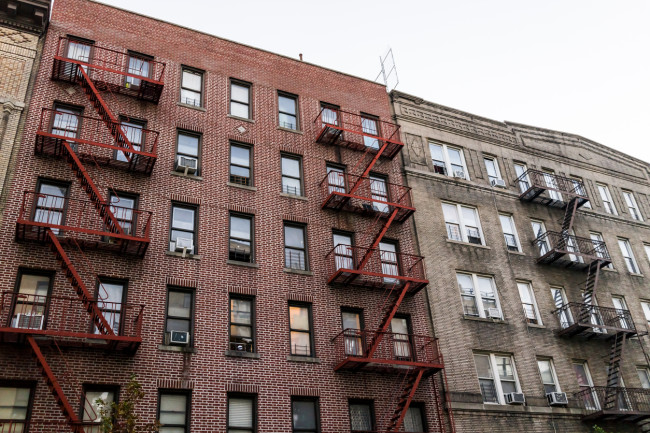What to know if your landlord is using a collection agency to go after your unpaid rent

It’s not yet clear whether lost income due to the coronavirus pandemic is a defense against non-payment of rent—these cases are only now just coming to court.
iStock
If you lost income during New York City's shutdown and are struggling to make rent as a result of the pandemic, it’s very likely your landlord is chasing you for money you haven’t been able to pay. Many New Yorkers owe a portion of their rent, while others owe rent going back to the spring.
Even though an eviction moratorium protects many renters from being thrown out, it doesn't prevent landlords from chasing tenants for unpaid rent. Now, some landlords are threatening to involve collection agencies and take tenants to court if they don’t pay promptly. Speaking on the Brick Underground Podcast, Andrew Scherer, visiting associate professor at New York Law School, says he's been hearing about this more in recent years, even before the pandemic.
"There's just a more aggressive treatment of rent arrears for people who have moved on for one reason or another," he says.
[Editor's note: An earlier version of this post was published in September 2020. We are presenting it again with updated information for December 2020.]
Tenant attorneys say they've seen a few of these cases in the past few months but Sam Himmelstein, a partner at HMGDJ Law (and a Brick Underground sponsor) says based on his experience more are coming. This is a new reality for many renters who, up until the spring, reliably paid their bills on time.
If your landlord is employing a collection agency, your priority is either to establish a defense or a payment plan. Keep in mind too that court cases are moving very slowly so if your debt issues end up being litigated, the final outcome will still be months off. Here are the steps to take as you move forward.
Understanding collection agencies
Collection agencies are employed by lenders in order to get back money that’s owed to them. As a third party, they’ll often get paid a percentage of what they recoup. The person your landlord employs might be a dedicated collection agency or an outside attorney brought in for this specific role.
It's possible your landlord or managing agent is using the term "collections" without being specific. They might also point out that moving your debt to collections will negatively affect your credit score. James Fishman, tenant attorney and partner at Fishman Law, says creditors use this language all the time. "It’s not very specific, it’s vague, and it’s intended to instill fear and get the person to pay."
As for your credit rating, credit bureaus don't pick up every delinquent payment passed to a collections agent, Fishman says.
"Your debt can only be reported to a credit bureau by an entity that subscribes to that credit bureau," he says. A good number of collection agencies do subscribe, but Fishman says it’s not a given that involving a collection agency will damage your credit score.
Under federal law, collection agents need to provide certain notifications when they reach out to you. One of these is "a disclosure that you have 30 days to dispute the validity of the debt," Fishman says. If you dispute the debt, the agency is "barred from reporting the debt to a credit bureau without also saying the consumer disputes this debt," he says. He also points out you are fully entitled to dispute the debt beyond the 30-day deadline.
Establishing a defense
If you are unable to pay, your first step is to write a letter to the collections agency disputing the debt, Himmelstein says. At that point, the agency must stop whatever collection procedures they are pursuing. "They can’t keep calling you and writing to you—that is considered illegal debt collection practices," he says.
You don't have to be specific about why you dispute the debt, Fishman says, but it can be helpful if you do. "You might point out the debt is already paid, or they are going after the wrong person," he says.
One defense might be that the apartment needed repairs or that services were not provided. If this is the case, Himmelstein says this could reduce the amount for which you are liable.
Many residents who knew they could not keep paying NYC’s high rents when coronavirus reduced their income in the spring either negotiated a lease break or moved away. One tenant (who wanted anonymity) contacted Brick Underground from out of state, saying they were being pursued for close to $15,000. The lease ended in August but their marketing income predominantly from government agencies and restaurants dried up when the pandemic hit.
It’s possible lost income as a result of the coronavirus is a defense against non-payment of rent. These cases are only just coming to court now, so no one knows for certain.
“There’s an argument to be made that if you lost your job because the government said your job does not exist for the next six months, that should be some kind of a defense,” Himmelstein says. Will courts accept these types of defenses? Himmelstein points out that when you are negotiating with a landlord or collection agency this unknown is something to use to your advantage. “I come right out and say it—'you want to be the test case for whether or not Covid should be a defense? Let’s go to court—maybe you won't get a dime.’”
Without defenses, you may well be sued by a collection agency. It's important to remember that when you sign a lease you are committing to paying that rent for the full 12- or 24-month period and each tenant on the lease is individually liable for the entire amount on the lease if someone defaults.
If you are going to dispute the debt, Himmelstein says the next step for the agency is to start a lawsuit in NYC civil court. Don't expect the case to move at any speed. "It will proceed very slowly—the courts are operating on fumes right now," Himmelstein says.
Scherer points out there's no right to counsel in this area and suggests getting legal help is your next best step.
Coronavirus aid
It's possible you may be in line for some government aid in order to pay your rent. The Covid rent relief program offered eligible households payment assistance for up to four months but only if you were rent burdened before the pandemic (paying more than 30 percent of your pay on rent) and your household income was below 80 percent of the area median income.
For those who didn't qualify or apply in time, it's not clear what happens next. Experts say there needs to be a robust federal response but efforts there have stalled.
In an interview with Brick Underground, State Senator Brian Kavanaugh pointed out that many times on public policy issues, landlords and tenants are at odds but he says, "in this case there is a broad agreement between landlords and tenants that the government should step in and assist with this rent."
Of course, not everyone who can't afford the rent can simply move—they don't have anywhere else to go. Fishman says in rent regulated apartments you don't need to be up-to-date with your rent payments in order for your lease to be renewed. In market-rate apartments however, the landlord is not obligated to renew your lease at all.
Establishing a payment plan or settlement
If it's a substantial sum you owe, Scherer points out Law Help NY is a good resource that can direct you to potential areas of assistance. The New York City Bar Association also has both a referral service and a hotline that takes questions.
If your managing agent or landlord was unresponsive to your appeals back in March or April, it's still worth trying to reach out to them again. Fishman says he is finding residential landlords are receptive to making deals because "they want to get something rather than nothing and they know they may end up with nothing."
He says if you have the ability to pay 50 percent of the rent in exchange for a release from the entire claim plus canceling the lease, that may not be a bad deal. "Be creative and figure out what you are able to do—if you do make an agreement like this you are buying peace. You don’t have to worry that two or three years down the road this could come back and cause you problems," he says.
It's possible that once a collection agency is involved, you will stop dealing with your landlord. “Usually the landlord does not want to to talk to you and the collection agency won’t let you talk to the landlord—they don’t want to be cut out of the process,” Himmelstein says.
That doesn't stop you from calling the landlord directly.
Fishman says it's always better to make a deal with the landlord just to make sure there is complete closure. Collection agencies will have their own arrangement with the landlord but if you do make a deal, Fishman says it's important to make sure it is in writing.
"Have it specify it is covering all claims, which includes past rent, or future rent [if you are breaking a lease]. That document then is a full defense if they were to come after you in the future," he says.
You Might Also Like


























